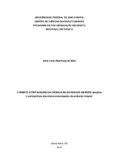| dc.creator | Silva, Anna Lúcia Noschang da | |
| dc.date.accessioned | 2020-03-11T19:47:54Z | |
| dc.date.available | 2020-03-11T19:47:54Z | |
| dc.date.issued | 2019-04-26 | |
| dc.identifier.uri | http://repositorio.ufsm.br/handle/1/19814 | |
| dc.description.abstract | The present dissertation proposes to reflect on the need to take a closer look at the protection of the fundamental right to privacy of digital natives with the advent of contemporaneity. In this way, was examined the desirable and possible ways of acting for social actors in charge of the integral protection of children (family, society and State) in safeguarding their right to privacy in the context of the Network Society. To answer the proposed problem, the work was developed in two chapters. The first is to identify who are the digital natives, what are the new ways of violating children's right to privacy and the unprecedented dangers arising from the use of information and communication technologies allied to the Internet. The second chapter aims to identify the role of each actor responsible for full protection in safeguarding children's right to privacy. As for the methodology, the method of deductive approach was chosen in order to respond to the proposed research problem, since it was based on general assumptions, considered true, about the current social context, which reaffirmed the right to privacy, in order to reach to specific, equally true conclusions about the role of those responsible for comprehensive protection. As for the methods of procedure, the historical, monographic, statistical and structuralist methods were chosen. In this way, it was verified that children can not be excluded from the use of the Internet, since their skills are indispensable for the 21st century. In addition, in spite of presenting many dangers, it was concluded that the benefits of the virtual world can not be ignored, which is why the use of this tool by the digital natives should take place under the watchful eye of all those in charge of protection integral. | eng |
| dc.language | por | por |
| dc.publisher | Universidade Federal de Santa Maria | por |
| dc.rights | Attribution-NonCommercial-NoDerivatives 4.0 International | * |
| dc.rights.uri | http://creativecommons.org/licenses/by-nc-nd/4.0/ | * |
| dc.subject | Crianças | por |
| dc.subject | Direito à privacidade | por |
| dc.subject | Família | por |
| dc.subject | Proteção integral | eng |
| dc.subject | Sociedade em rede | eng |
| dc.subject | Children | eng |
| dc.subject | Right to privacy | eng |
| dc.subject | Family | eng |
| dc.subject | Integral protection | eng |
| dc.title | O direito à privacidade da criança na sociedade em rede: desafios e perspectivas dos atores encarregados da proteção integral | por |
| dc.title.alternative | The right to children's privacy in network society: challenges and perspectives of actors in charge of integral protection | eng |
| dc.type | Dissertação | por |
| dc.description.resumo | A presente dissertação se propõe a refletir sobre a necessidade de se dirigir um olhar mais atento à proteção do direito fundamental à privacidade dos nativos digitais com o advento da contemporaneidade. Dessa forma, examinaram-se quais as formas de atuação desejáveis e possíveis aos atores sociais encarregados da proteção integral das crianças (família, sociedade e Estado) na salvaguarda do seu direito à privacidade no contexto da Sociedade em Rede. Para responder a problemática proposta, o trabalho foi desenvolvido em dois capítulos. O primeiro se ocupa a identificar quem são os nativos digitais, quais as novas formas de violação do direito à privacidade das crianças e os perigos inéditos decorrentes do uso das tecnologias de informação e comunicação aliadas à internet. O segundo capítulo visa identificar o papel de cada um dos atores responsáveis pela proteção integral na salvaguarda do direito à privacidade das crianças. Quanto à metodologia, optou-se pelo método de abordagem dedutivo a fim de responder ao problema de pesquisa proposto, uma vez que se partiu de premissas gerais, consideradas verdadeiras, acerca do atual contexto social, que ressignificou o direito à privacidade, para se chegar a conclusões específicas, também verdadeiras, sobre o papel dos responsáveis pela proteção integral. Quanto aos métodos de procedimento, elegeram-se os métodos histórico, monográfico, estatístico e estruturalista. Dessa forma, foi verificado que não se pode excluir as crianças do uso da internet, tendo em vista que as habilidades dela decorrente são indispensáveis para o século XXI. Além disso, apesar de apresentar muitos perigos, concluiu-se que não se pode ignorar os benefícios que o mundo virtual oferece, motivo pelo qual o uso dessa ferramenta, pelos nativos digitais, deve se dar sob o olhar atento de todos os encarregados da proteção integral. | por |
| dc.contributor.advisor1 | Nascimento, Valéria Ribas do | |
| dc.contributor.advisor1Lattes | http://lattes.cnpq.br/6294253776126361 | por |
| dc.contributor.referee1 | Oliveira, Rafael Santos de | |
| dc.contributor.referee1Lattes | http://lattes.cnpq.br/9933895574541972 | por |
| dc.contributor.referee2 | Fortes, Vinícius Borges | |
| dc.contributor.referee2Lattes | http://lattes.cnpq.br/9447382459194562 | por |
| dc.creator.Lattes | http://lattes.cnpq.br/6290257310460076 | por |
| dc.publisher.country | Brasil | por |
| dc.publisher.department | Direito | por |
| dc.publisher.initials | UFSM | por |
| dc.publisher.program | Programa de Pós-Graduação em Direito | por |
| dc.subject.cnpq | CNPQ::CIENCIAS SOCIAIS APLICADAS::DIREITO | por |
| dc.publisher.unidade | Centro de Ciências Sociais e Humanas | por |



